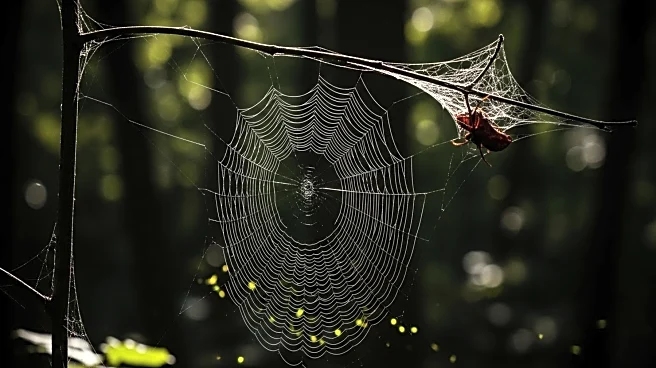What's Happening?
Recent research published in the Journal of Animal Ecology reveals that the sheetweb spider, Psechrus clavis, exploits the luminescence of fireflies to attract more prey. The study, led by ecologist I-Min Tso from Tunghai University, demonstrates that these nocturnal predators use firefly light as bait, significantly improving their hunting success. Observations and experiments showed that spiders leave fireflies hanging in their webs for extended periods, unlike other prey such as moths, which they consume immediately. This behavior suggests that spiders may use bioluminescent signals to identify fireflies and adjust their prey handling behavior accordingly. The study involved experiments with LED lights mimicking firefly glows, which attracted more prey, particularly male fireflies mistaking the artificial glow for potential mates.
Why It's Important?
This discovery highlights the complex interactions between predators and prey, showcasing an evolutionary adaptation that enhances the spider's hunting efficiency. The ability to manipulate firefly luminescence could have broader implications for understanding predator-prey dynamics and ecological balance. It also raises questions about the ethical considerations of using artificial methods to study natural behaviors, especially concerning threatened species like fireflies. The findings could influence future research in ecology and evolutionary biology, potentially leading to new insights into how species adapt to their environments.
What's Next?
Further research may explore the natural conditions under which spiders exhibit this behavior, potentially involving field experiments with real fireflies. However, such studies face practical and ethical challenges due to the conservation status of many firefly species. Researchers might also investigate other species that exhibit similar predatory strategies, expanding the understanding of bioluminescence exploitation in nature. The study could prompt discussions on the conservation of fireflies and the ecological roles they play.
Beyond the Headlines
The study opens up discussions on the ethical implications of using artificial methods in ecological research, especially when dealing with threatened species. It also highlights the potential for spiders to develop complex predatory strategies, which could influence the ecological balance and biodiversity. Understanding these interactions may lead to better conservation strategies and insights into the evolutionary pressures that shape species behavior.










